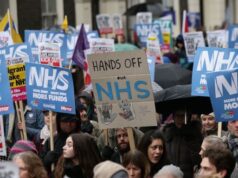Issue: 17
September 2014
This occasional newsletter is researched, written and edited by a group of concerned residents in Ealing, West London who want to preserve our NHS. We view the wholesale engagement of private, for-profit healthcare service suppliers as unnecessary, profligate and dangerous. Process improvement is what is needed in our NHS – not revolution.
‘Nearly 100 GP Surgeries in London Face Closure’
So says the Royal College of General Practitioners (RCGP). RCGP blames this on the Government’s changing the funding formula and taking money away from deprived areas such as East London. This funding change is the removal of the Minimum Income Practice Guarantee (MIPG). The MIPG was introduced in 2004 to support practices moving to a new GP contract. It’s a top up payment given to some GP surgeries. The Government began stopping these payments in a phased programme over seven years which began in April 2014. The Government argues that MIPG funding is not weighted to reflect the demographics of a practice population.
The Jubilee Street GP surgery in Bow, London faces losses of over £900,000 if these funding cuts go through says Practice Manager, Virginia Patania. She expects her practice to close in November unless the NHS provides them with another funding support solution.
Replacement GP Surgeries May Be Run By Private Providers
On 18 August 2014 ‘Pulse’ magazine revealed that all new GP contracts are to be thrown open to private providers. Allegedly Competition Law now demands that GMS or PMS contracts are no longer appropriate and time-limited APMS contracts will be used instead. General Medical Services (GMS) contracts and Personal Medical Services (PMS) contracts both exclusively contract GPs with the NHS. Alternative Provider Medical Services (APMS) contracts were introduced in 2004 to support the Labour Government’s ill-fated polyclinics initiative.
APMS facilitates a whole host of types of organisations to provide primary healthcare. These include commercial providers, voluntary sector providers, mutual sector providers, social enterprises and public sector bodies. APMS allows one private provider to transfer the GP surgery contract to another private provider. There have been some APMS contract failures including Camden Road Surgery in London. UnitedHealth ran this surgery for three years under an APMS contract. It then sold it to another private firm – The Practice – who closed it down in April 2012, leaving 4,500 people without a doctor.
Ealing GPs Publicly Silent on the Challenges Facing Them
Given the obvious pressures on GP surgeries it seems quite odd that apparently none of the 200+ GPs practising in Ealing and none of the 79 GP surgeries have apparently spoken publicly about the pressures they face.
These challenges and pressures include:
+ Heavy case loads – each GP seeing 30 to 40 patients every day
+ Being encouraged to extend surgery hours
+ Threats by CQC to place under-performing GP surgeries in ‘Special Measures’
+ 90% of GPs feel pressure from patients to hand out antibiotics (research by Nesta)
+ Offering (or not offering) mental health primary care
+ The impending closure of Central Middlesex Hospital A&E (10 September 2014)
+ The impending closure of Ealing Hospital A&E (When?)
+ Ealing GPs to work in six ‘Health Networks’
+ Patient consultation by telephone – just how effective and efficient is this?
+ An additional 10,000 GPs needed nationally for a sustainable service (RCGP)
+ 56.6% of GP surgeries have been unable to recruit doctors (RCGP)
+ Shortage of District Nurses and Community Matrons
+ Implementing the Better Care Fund (BCF), which aims to integrate healthcare with social care
A&Es at Central Middlesex and Hammersmith Hospitals To Close on 10 September 2014: NHS Public Leaflets Inform, Mislead and Infuriate
It’s very worrying to be just days away from one of the early phases of the unique social experiment that is ‘Shaping a Healthier Future’- i.e. the closure of NHS A&E units in Park Royal and in East Acton.
NHS leaflets publicising the closures were delivered to homes in Hanwell, Ealing in August. The leaflets are strangely incompetent as regards the mentally ill. 1 in 5 adults and 1 in 10 children are mentally ill. There is guidance in the leaflet as to which physical medical conditions are suitable for treatment at big GP surgeries called Urgent Care Centres (UCCs) and which are suitable for treatment at NHS hospital A&Es. However no guidance at all is provided for those who are mentally ill. This omission makes an absolute nonsense of the 2013 guidance from NHS National Medical Director Sir Bruce Keogh for parity of care and esteem for both physically and mentally ill patients. Whoever approved this leaflet text ought to be fired.
The leaflet also strangely lists ‘the nearest A&E departments’ as those at Northwick Park Hospital, St Mary’s Hospital and Charing Cross Hospital. This statement is quite clearly a lie. Ealing Hospital A&E and West Middlesex A&E are the two closest A&Es for those living in Hanwell, Ealing. Also the new A&E unit at Northwick Park will not be complete till October 2014.Were the wrong leaflets delivered to homes in Hanwell?
The latest CQC report on Northwick Park Hospital A&E describes significant staff shortages and states that the service requires improvement. Services which CQC say need improvement also include surgery, critical care, maternity and family planning, services for children and old people and outpatients. So the suffering citizens of Hanwell are to be directed (by ambulance) to Northwick Park Hospital A&E as from 11 September 2014. How this will play out in a short staffed/improvement needed A&E department some five miles away though congested traffic is all too clear. Long waits for an ambulance, long waits inside an ambulance, long waits in A&E reception, more pain and possibly more deaths.
Self-Harming and Overcrowding on the Increase in England’s NHS Mental Health Trusts
The Labour Party, using Freedom of Information requests, has discovered a 56% increase in self-harming over four years in NHS mental health trusts. Also instead of trusts operating up to a maximum of 85% capacity, some of the trusts are operating at up to 135%.
More ‘Physician Associates’ is Jeremy Hunt’s Solution to Shortages of Doctors and Nurses
To cope with the shortage of doctors and nurses in NHS GP surgeries and NHS hospitals the Government is advocating training and using more science graduates with just two years medical training. ‘Real’ doctors receive seven years medical training.
Apparently these associates are allowed to carry out triage, diagnoses, admission and discharge of patients. However they are not allowed to sign off prescriptions and will not be registered with the General Medical Council. Annual salaries of £30,000 to £40,000 per year make these associates a much cheaper option than fully qualified doctors.
Fans of these associates cite the fact that there are 80,000 of them (presumably operating successfully) in the US healthcare service. There is also a move in England to re-name these associates as ‘assistants’ on the basis that this would clarify their role.
The role of a Physician Associate in the NHS sounds somewhat similar to Police Community Support Officer (PCSO) in the Metropolitan Police. PCSOs look like ‘real’ Police persons, but are no such thing and have only limited powers. PCSOs get paid less than real police.
Incompetent triage and diagnosis could lead to more pain, longer lasting medical conditions and possibly unnecessary deaths.
50 Carers for the Disabled in Doncaster On Strike: Care UK Cuts Wages of 237 Former NHS Staff by 25%
‘The Observer’ has reported on a long running strike by former NHS staff in Doncaster. Care UK won a contract in November 2013 to run community care services for the NHS, involving 140 people with learning disabilities located in about 40 properties in Doncaster. 237 NHS staff transferred to work for Care UK.
When Care UK reduced wages by 25% some staff left in disgust. 50 of them went on strike. When they worked for the NHS, the carers’ basic hourly rate was £8.91. Care UK cut this to £7/hour. 100 new staff are being recruited at £7/hour. On 11 August 2014 the 50 strikers voted to extend the strike – taking their action with no pay to nearly 70 days.
Care UK says that workers’ demands are unrealistic in the light of reduced funding available for the NHS. However the company would have been only too aware of the funding realities when they signed the contract ten months ago.
There is no legal requirement for support workers to have qualifications before they deliver care. Less than half the British care workforce have completed a basic NVQ Level 2 qualification.
Care UK was acquired by private equity firm Bridgepoint Capital in 2010. Bridgepoint owns a range of businesses which include the Pret à Manger café chain and clothing retailer Fat Face.
Surely NHS Hospitals Should be Cost Centres Not Revenue Earning Organisations?
One of the most ludicrous aspects of the Health & Social Care Act 2012 is that it allows NHS hospitals to ‘earn’ up to 49% of total revenue from treating private patients. As more resources are used on treating private patients, then clearly fewer resources are devoted to ‘public’ patients who have already paid for their treatment via National Insurance payments.
London NHS hospitals which are devoting reduced resources to treating public patients include:
Name Increase in private patient revenue
2010/11 to 2013/14
University College 39.63% to £10.3 million
Royal Brompton 37.7% to £33.6 million
Moorfields Eye 31.84% to £21.3 million
Chelsea & Westminster 20.99% to £13 million
Failed ‘NHS National Programme for IT’ (NPfIT) Project Just Cost Us All Another £481 Million
In 2002 Microsoft founder Bill Gates persuaded our then Prime Minister, Tony Blair, to set up an online system so that NHS patient records could be accessed instantly anywhere. This promised to be the biggest civil IT project in history. The cost of the project was estimated at £11.4 billion. The project was spectacularly mismanaged and was terminated with nothing or little to show in 2011.
Fujitsu, just one of the IT suppliers involved, had its £896 million contract terminated in 2008 and it threatened to sue the Government. On 1 August 2014 it was leaked that the Government would pay Fujitsu £400 million in compensation and £50 million to cover Fujitsu’s legal costs. The Government’s legal costs are £31.5 million. Estimates of the total losses on the whole NPfIT project range from £10.5 billion to £13.2 billion.




